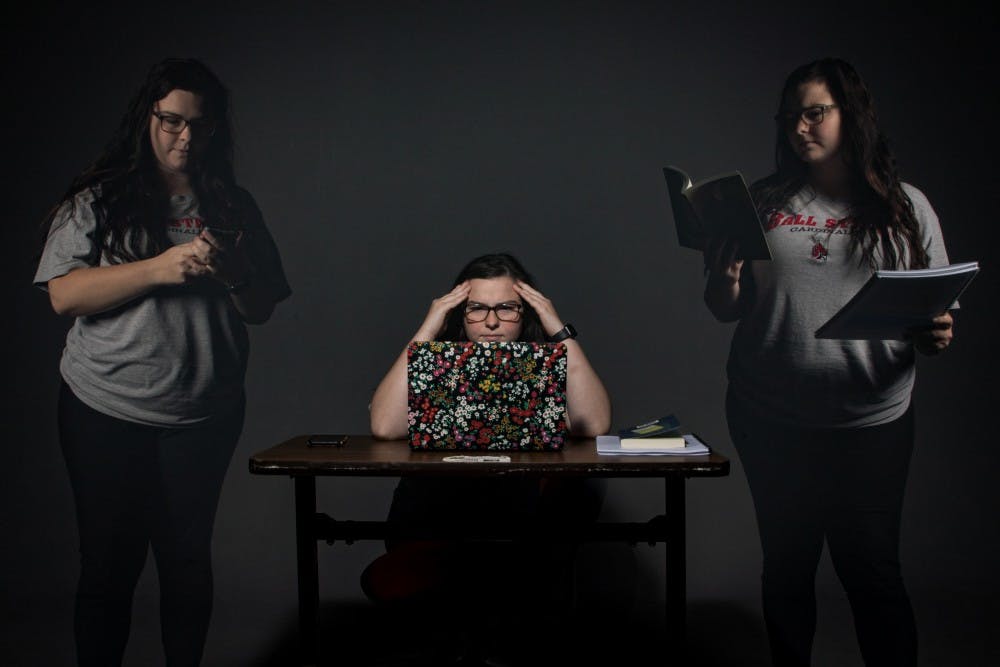
Sophie Nulph is a sophomore journalism major and writes “Open-Minded” for The Daily News. Her views do not necessarily agree with those of the newspaper. Write to Sophie at smnulph@bsu.edu.
Sitting in class, I stare down at my dedicated “to-do” notebook. I write all of my lists in the same color pen at least once a week. When a due date changes, I have to completely re-write the list on a new page.
As I stare down at all my homework assignments, obligations and responsibilities, my mind grows fuzzy. My deafening thoughts drown out the professor’s lecture, and my leg involuntarily begins to shake as I think of the lack of time I have to get each assignment done.
Subconsciously, I begin biting my nails as I worry about failing an upcoming exam, even though I know I understand the content well.
As I look down at my bleeding cuticles, my professor's voice floats back in my head.
The clock strikes 10 ‘til, and my anxiety increases as I realize I have been too worried about the rest of my obligations to focus on the lecture right in front of me.
I suffer from anxiety, and I have developed obsessive-compulsive tendencies to help cope with it. I have suffered from this for years, and I have always been afraid to tell people because I viewed it as a weakness.
But it is not a weakness, it is a quality that makes me stronger and I am not afraid anymore.
My anxiety is not a vulnerability to me but instead a way for me to educate others about mental illnesses and show they are nothing to be ashamed of.
The stigma surrounding mental illnesses is so negative that people feel like they must apologize to someone if they find out they have one. People don’t apologize to those with diabetes or heart disease, so why do people apologize to those with anxiety, depression or other mental illnesses?
It’s because people see us as fragile and weak. Mental illnesses are associated with instability, making those without them feel like they must step on glass. Due to this treatment, the negative stigma never goes away.
Mental illnesses have had a negative viewpoint since B.C. — when people in ancient Egypt believed those with illnesses were possessed and viewed it as a “religious punishment.”
As humanity developed, our views of mental illnesses sadly did not. We began institutionalizing people with illnesses. Views didn't change until 1979 when the National Alliance on Mental Illness (NAMI) was formed to help advocate and educate people about mental health.
Despite this, NAMI has not prevented people from treating me like their wedding china when they find out that I am not “normal.” I used to feel vulnerable telling someone I have anxiety because I still saw it as a weakness. Now I do not.
We know more about mental illnesses and chemical imbalances than we ever have before. But this does not stop society from teaching people from a young age that speaking about illnesses is not okay simply because of its history.
People have told me to stop, as if my anxiety has a switch I can simply flip on and off when I decide I no longer want to deal with it. People tell me I can choose to be stressed or not by the actions I take and the situations I put myself in.
What they don’t know is anxiety doesn’t let me decide, it decides for me.
I have always seen my mental illness as another entity entirely. It is not a part of me — it is a big, green jelly monster that controls the way my mind works. It is always beside me, sometimes sleeping, sometimes smiling its devilish grin.
Anxiety is not something you can just ignore and it will go away. It is not a bully, it is a monster that grows stronger when you feed into it and falls dormant when you don’t, but it never truly disappears.
I don’t expect people to know what’s going on in my mind, but I wish more people would show more empathy for the situations I am going through.
When I am going through these anxiety-inducing situations, I don’t need to be asked if I’m OK. I don’t need to be treated like I am a ticking time bomb ready to burst into a mental breakdown any second. I want to be treated like anyone else that is having a bad day simply because I am like everyone else. If I had not told you that I suffer from a mental illness, chances are you would have never known. I act normal, I look normal, I speak normally.
Most of the time, society is unaware that someone has a mental illness unless that person decides to make it public.
Mental illnesses do not deserve an apology, they deserve applause. They do not deserve judgment but recognition.
The only way to stop the stigma is to speak up loud and be proud. There is no reason to hide such a common disease. Mental illnesses are something to celebrate. I have been ashamed for who I am for long enough and it’s about time that I am proud of each and every part of me.





The Daily News welcomes thoughtful discussion on all of our stories, but please keep comments civil and on-topic. Read our full guidelines here.